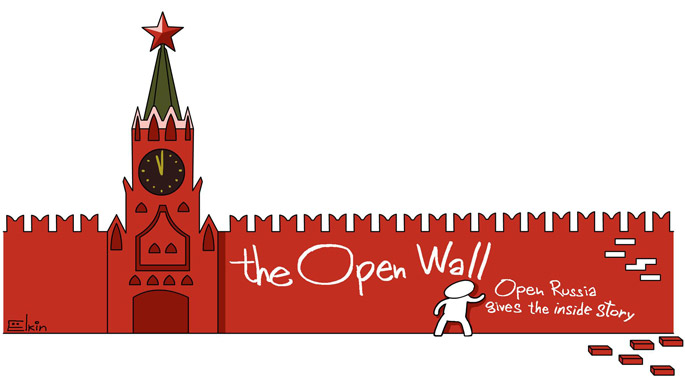All that glitters is not gold
All that glitters is not gold
A wide-ranging and sometimes almost schizophrenic campaign is being waged against the nation’s “gilded youth.”

Ilya Klishin
The classic television adaptation of P.G. Wodehouse’s comic novels about the playboy Bertie Wooster and his shrewd manservant Jeeves, brilliantly played by Hugh Laurie and Stephen Fry, begins with a scene in court. In a fit of drunken debauchery, for a prank, young Wooster has stolen a policeman’s helmet. Still under the influence (so much so that he can barely speak, but is only able to grunt) he is hauled up before the stern face of the law, in the person of a magistrate who fines him the grand total of five pounds for this impertinent theft and offence against a guardian of public order.
There is an uncanny similarity between this comic story about the lives of bright young things in the 1920s, and the spectacle that has been unfolding over the last few weeks on Russian television, where a wide-ranging and sometimes almost schizophrenic campaign is being waged against the nation’s “gilded youth.”
The whole thing was sparked off by the story of Ruslan Shamsuarov, son of the vice-president of the oil company Lukoil. He, together with some friends, tried to evade police who were in pursuit of his speeding Mercedes, but, when they finally caught up with him, “came to an agreement” with them on the spot, and was let off with nothing worse than a fine. The situation was spiced up considerably by the fact that the boy racer broadcast the whole thing live on air with the help of his mobile phone. Social networks went into overdrive.
Shamsuarov’s arrest was broadcast on all the Moscow and federal channels – marked “URGENT,” as if the government wanted to say “See? You still can’t buy everyone off in our country!” But whoever it was in the President’s administration that had the idea of headlining the item, made a catastrophic miscalculation.
To start with, the court only handed Shamsuarov fifteen days of administrative detention. This is the same amount of time usually given to a suspect detained for an unofficial political demonstration, or when the Special Forces “put the screws” on somebody for alleged opposition to the Russian authorities.
But this was only the beginning of Shamsuarov’s public shaming. Four times after this, the Investigative Committee brought criminal cases against Shamsuarov. Two of these were for disorderly behaviour, and two for threatening and insulting public officials; then, all four cases were closed down by another institution: the General Prosecutor’s Office.
The whole country observed this legal ping-pong with fascination. There was nothing very surprising about it, but because the story had gone national by the time of Shamsuarov’s detention, it became a source of blatant humiliation for those law enforcement officers who had addressed TV cameras with stony faces only a week previously, to assure viewers that they would not be cutting the “gilded youth” any slack, and even to tell off their subordinates.
Generally, of course, people already knew that this is the way things work in Russia; the children of ministers, governors, deputies and oligarchs can do pretty much as they please – they are above the law. However, as a rule, legal cases of this sort are sorted out behind closed doors using some dubious but evasive formulation: a provisional sentence, perhaps, or probation granted on the quiet.
But now the fact that people have been able to watch live on Channel One the quashing of not one, not two, but four criminal cases in a row, has astonished everybody. We’re used to some story being dragged out onto our screens in order to make an example of somebody, or to prepare the way for a new law (on child suicide, for instance, or designer drugs, to name two recent, striking examples), only then the script ought to run to plan. This time, however, the “drama” has been derailed by the infighting between law enforcement officers, exacerbated by the influential status of the boy racer’s father.
The authorities wanted to show that not everything could be fixed with the help of a phone call; they wanted to show that rich kids who got too big for their boots could still be put in their place. But they have ended up endorsing the exact opposite.
Nevertheless, the campaign against the “golden youth” continues to gather momentum. This is hardly surprising: in every Russian town you will find some brainless rich kid with a sports car quite capable of running down old women at pedestrian crossings, or young mothers with pushchairs. To make an example out of these young men, or try to do so, is an extremely efficient way of generating political capital. Few can unite Russian society as they can: liberals, conservatives, Putin’s supporters and his opponents are all unanimous in their hatred of Russia’s “gilded youth.”
And yet this is precisely why the whole thing will come to nothing. The confusion now surrounding the Shamsuarov case is no accident – it is entirely in the order of things. These crazy adolescents, whether or not they have been educated in England, America or Switzerland, are their fathers’ sons; and these are fathers who use flashing blue lights to skip traffic jams, and who have never paid the slightest attention to the criminal code in their lives. As far as these young men are concerned, the public are simply cattle to be manipulated by spin-doctors and television. The police for them are simply their parents’ minions, with truncheons at the ready. As for the law-courts – all it takes is for the right person to make a phone call.
To conduct any serious campaign against the “gilded youth” of Putin’s Russia is tantamount to putting a bomb under the very foundation of the political system. These young people are a product of the ugly, firmly entrenched regime in Russia, and can only be curbed by properly functioning institutions of power. It is stupid and naive to assume that they will, in the space of a couple of generations, become a genuine aristocracy. They are a far cry from Bertie Wooster and his ilk. In fact, in all honesty, they cannot even be regarded as “gilded youth” at all. They merely prove the truth of the saying, “all that glitters is not gold.”




